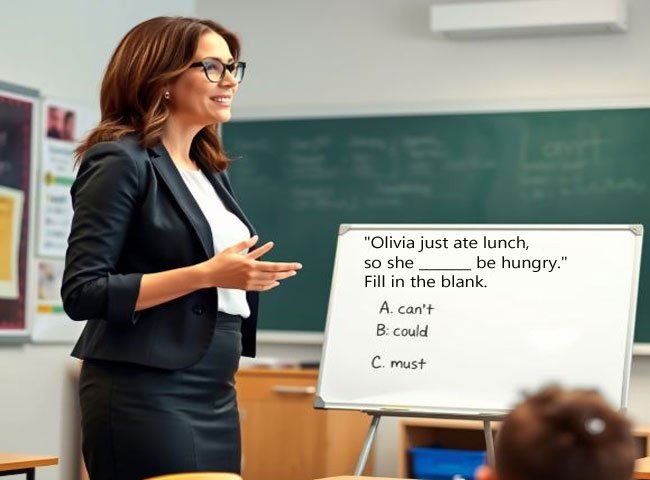Understanding modal verbs of deduction is crucial for anyone learning English grammar at an intermediate or advanced level. Don’t miss to participate the Modal Verbs of Deduction Quiz. These verbs—must, might, may, could, can’t—help us express how certain we are about something, based on the evidence we have. They allow us to logically deduce possibilities about past, present, and future events.
Whether you’re a student, teacher, or just someone looking to polish your grammar, this Modal Verbs of Deduction Quiz will challenge your ability to make logical assumptions using correct modal verbs. You can take the quiz online it out for offline practice. It also works as a great classroom resource!
Modal Verbs of Deduction Quiz
Participate also more related quiz test: Verb Forms Quiz
Modal Verbs of Deduction Quiz (Multiple Choice Questions)
Choose the best option in each question to test your understanding of modal verbs used for deduction.
1. A deduction is a logical conclusion based on facts and:
A) Imagination
B) Evidence
C) Prejudice
2. “Lucas must be tired after working all night.” Which is the modal verb of deduction?
A) be
B) must
C) tired
3. “Olivia just ate lunch, so she _______ be hungry.” Fill in the blank.
A) can’t
B) could
C) must
4. Which modal verb expresses a deduction with low certainty (around 30%)?
A) must
B) might
C) shall
5. “He may be at the gym right now.” What is the degree of certainty?
A) 100%
B) 0%
C) 50%
6. “Liam didn’t come to work today. He _______ been sick.” Choose the correct option.
A) must
B) must have
C) must be
7. “The lights are off, and no one’s answering. They must _______ out.”
A) have gone
B) be gone
C) go
8. Which sentence shows you’re sure something is false?
A) That might not be true.
B) That can’t be true.
C) That could be false.
9. Which best supports the deduction “She must be a teacher”?
A) She walks a lot
B) She loves painting
C) She carries textbooks
10. Which sentence shows a past deduction with high certainty?
A) They must be working
B) They must have left
C) They may have gone
Modal Verbs of Deduction Quiz Answers
- B) Evidence
- B) must
- A) can’t
- B) might
- C) 50%
- B) must have
- A) have gone
- B) That can’t be true.
- C) She carries textbooks
- B) They must have left
Conclusion
Modal verbs of deduction help speakers express how sure they are about something. By mastering their usage, especially in contexts involving reasoning and assumptions, your English fluency improves dramatically.
Whether you’re preparing for exams, writing essays, or engaging in everyday conversations, understanding how to use “must,” “might,” “could,” and “can’t” appropriately will enhance your grammar skills.
Keep practicing with quizzes like this one to sharpen your understanding. You can revisit this page whenever you want a refresher!
FAQs about Modal Verbs of Dedication
What are the modal verbs of deduction?
Modal verbs of deduction express how certain or uncertain we are about something. They include words like must, might, may, could, and can’t.
What’s the difference between ‘must’ and ‘might’?
‘Must’ indicates a high degree of certainty (strong deduction), while ‘might’ suggests a lower level of certainty (a possibility).
Can modal verbs of deduction be used for the past?
Yes. For example:
“She must have gone home.” (past deduction)
“He can’t have seen her.” (negative past deduction)
What’s the most certain modal verb?
“Must” is used when you’re almost sure something is true.
“Can’t” or “cannot” expresses strong certainty that something is false.
Can I use these modal verbs in formal writing?
Absolutely! Modal verbs of deduction are commonly used in both formal and informal contexts, particularly in analytical or argumentative writing.

